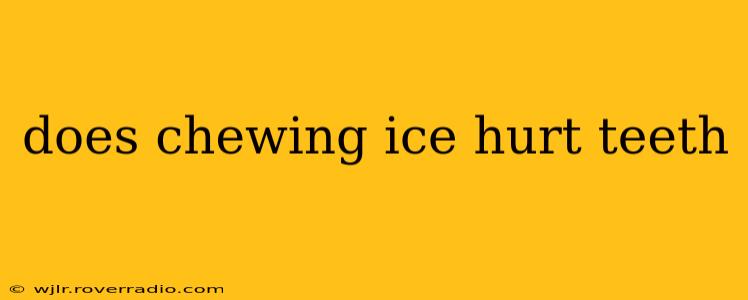Many people enjoy the refreshing crunch of ice, but is this habit damaging to your teeth? The short answer is: yes, chewing ice can significantly hurt your teeth. While an occasional accidental chip might not cause major problems, consistently chewing ice can lead to a range of dental issues. This article will explore the potential consequences and answer frequently asked questions surrounding this common habit.
What Happens When You Chew Ice?
The enamel that protects your teeth is the hardest substance in the human body, but it's not invincible. Chewing ice subjects your teeth to extreme forces. Ice is hard and brittle, and when you bite down, the pressure exerted on your teeth can lead to:
- Cracked or chipped teeth: This is the most common consequence. Cracks can be microscopic at first, making them difficult to detect, but they can eventually lead to significant damage.
- Fractured teeth: More severe than chipping, a fracture extends deeper into the tooth structure, potentially reaching the pulp (the inner part containing nerves and blood vessels). This can cause intense pain and require extensive dental work.
- Worn enamel: The constant abrasion from chewing ice gradually wears away the protective enamel layer, leaving your teeth more vulnerable to cavities, sensitivity, and discoloration.
- Increased tooth sensitivity: Once the enamel is worn down, the dentin (the layer beneath the enamel) is exposed. Dentin contains microscopic tubules that lead to the pulp, making your teeth sensitive to hot, cold, sweet, or sour foods and drinks.
How Can I Tell If Chewing Ice Has Damaged My Teeth?
Identifying early damage from chewing ice can be tricky. However, be aware of these signs:
- Sharp pain when biting down: This could indicate a crack or fracture.
- Increased tooth sensitivity: Experiencing pain from temperature changes or certain foods suggests enamel wear.
- Visible cracks or chips: A thorough examination in a mirror or from your dentist can reveal visible damage.
- Discoloration: Darkening of the tooth could indicate internal damage or decay.
Is Chewing Ice Addictive?
While not classified as a clinically recognized addiction, many people who chew ice describe it as a compulsion or habit they find difficult to break. The satisfying crunch and cooling sensation can be rewarding, leading to repetitive behavior.
Can I Repair Damaged Teeth From Chewing Ice?
Fortunately, many instances of ice-related tooth damage can be repaired. Depending on the severity:
- Minor chips or cracks: These may be smoothed and polished by your dentist.
- Larger fractures: These often require fillings, crowns, or root canal treatment to save the tooth.
- Severe damage: In cases of extensive damage or infection, tooth extraction might be necessary.
How Can I Stop Chewing Ice?
Breaking the habit of chewing ice requires conscious effort and may involve:
- Identify triggers: Understand what situations or emotions prompt you to chew ice.
- Find alternatives: Explore healthy alternatives like chewing sugar-free gum or drinking plenty of cold water.
- Mindfulness: Pay attention to the habit and consciously choose not to chew ice.
- Seek professional help: Consider talking to a dentist or therapist if the habit is causing significant problems.
What are the Long-Term Effects of Chewing Ice?
Long-term consequences of chewing ice range from increased dental sensitivity and discoloration to significant tooth loss. Early intervention and breaking the habit are crucial to prevent serious and potentially costly dental problems.
Conclusion
Chewing ice may seem harmless, but the long-term effects on your dental health can be severe. By understanding the risks and actively seeking solutions, you can protect your teeth and maintain a healthy smile. Remember, regular dental checkups are crucial for early detection and treatment of any damage.
